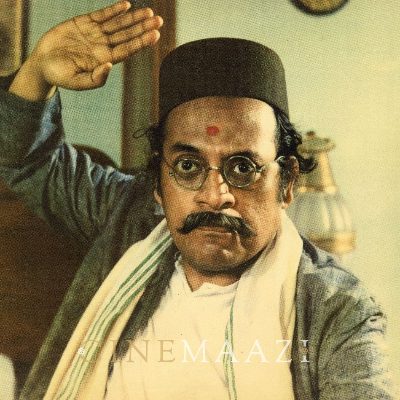This section is for paid subscribers only. Our subscription is only $3700/- for one full year.
You get unlimited access to all paid section and features on the website with this subscription.
Subscribe to read full article
This section is for paid subscribers only. Our subscription is only $37/- for one full year.
You get unlimited access to all paid section and features on the website with this subscription.
Not ready for a full subscription?
You can access this article for $2, and have it saved to your account for one year.
- Release Date1977
- GenreComedy, Satire
- FormatColour
- LanguageHindi
- Run Time142 min
- Length3920.84 meters
- Gauge35mm
- Censor RatingU
- Censor Certificate Number86123-Mumbai
- Certificate Date24/11/1977
- Shooting LocationAshok Hotel, Qutub Hotel, Vigyan Bhavan, New Delhi
Set in the allegorical nation of Jan Gan Desh, this film satirises political corruption and the loss of the hope for democracy. Jan Gan Desh is in the midst of its elections, fought between its two major parties – the peeli (yellow) party and the neeli (blue) party. Meera Devi, a member of a high society club, decides to form her own party (the Kaali party) and in the process demonstrate the true nature of politics. She and her partner Gopal pick out a poor actor who sells medicines for a living as their Presidential candidate. Soon this man is rechristened Professor Gangaram and trained to be a political speaker by Meera. He is asked to win over the personified avatar of the people Janata. After Janata has been wooed Meera and Gopal pay off his chief political opponents and soon winning the elections is a surety.
When Gangaram ascends to power he is led to the chair of the president - the highest seat of power in the country. But when Gangaram tries to sit on the chair he gets thrown off. The chair becomes sentient and demands that he forget all the promises made to Janata and only worship it. He is also assigned an assistant Deshpal whose corrupting influence soon turns him into a philanderer. All of Gangaram’s ideals of socialism and equality are instantly forgotten. The film proceeds to demonstrate the farcical natures of the bureaucracy, the judiciary and opposition parties. They are all after money including a religious guru Swamiji who pretends to oppose Gangaram only to extort money from him. From time to time Gangaram puts up bogeys to distract people from the real problems of the nation – chief among them a campaign against rats declaring them to be the root cause of hunger or a mock war with the neighbouring nation of Andheri Nagri. Gopal who is an idealist finally becomes fed up with these practices. He tries to convince Meera but she too has been blinded by her own power. Gopal attempts to get a vote of no confidence passed against Gangaram. The allure of money proves to be too much though and he is betrayed. Ultimately he is murdered by Deshpal and his death is declared a suicide. All this while Janata who once believed in Gangaram becomes increasingly disillusioned with him.
The nadir of Gangaram’s reign comes when Janata is paraded to his offices one day by the police and is subsequently raped by Deshpal. When a horrified Gangaram questions Deshpal about it he replies he only did what Gangu and his government have been doing all along. A traumatised and defeated Janata commits suicide. When rumblings begin against Gangaram from the opposition he declares an emergency and has all opposition leaders arrested. Meera begins to doubt whether Gangaram is truly her puppet or has actually supplanted her. Fearing the worst she attempts to poison him but before the poison can work she is strangled to death by Gangaram. Gangaram declares her a traitor to the nation and covers up his crime. At that time the poison finally takes effect. While he is dying Gangaram spots the same medicine man for whom he used to work. He dies in front of him – another victim of an endless cycle of power and corruption.
The original version of this film caused controversy due to its parodies of Sanjay Gandhi’s Maruti Udyog and campaigns of forced sterilisation. The Indira Gandhi led central government prevented its exhibition in 1975 and the film was consequently confiscated. The confiscated copies of the film were burnt by Sanjay Gandhi and his men at the Maruti factory in Gurgaon. Sanjay Gandhi and V.C. Shukla, the Information and Broadcasting minister of the time, were sentenced with two years of imprisonment as a result. This verdict was ultimately overturned. The film was remade by the director after the Emergency.
Cast
-
Manohar Singh
Gangaram 'Gangu' -
Surekha Sikri
Meera -
Raj Kiran
Gopal -
Shabana Azmi
Janata -
Katy Mirza
Ruby Dixsana -
Chaman Bagga
Deshpal -
Utpal Dutt
Swamiji/ Mandrake the Magician -
Swapna Sundari
Dancer/Singer
Crew
-
BannerDhwani Prakash, Bombay
-
Director
-
Producer
-
Music Director
-
Lyricist
-
Dialogues
-
Cinematography
-
Editing
-
Sound Recording/ Audiography
-
Choreography
-
Production Controller
-
Re-recordist/ Sound Mixing
-
Laboratory/ Processed atNavrang Cine Centre (P) Ltd.
-
Music CompanyPolydor Records
-
Writer











.jpg)



